Dogs may feel stressed or anxious for many reasons. Find out what causes stress in dogs, the signs to look out for, and how you can calm a stressed dog.
When our dogs are feeling stressed or unhappy, it’s not always easy for them to let us know. As owners, it’s up to us to be alert to any signs of stress and help them through their fears. Read on to find out more about the causes of canine anxiety, learn how to recognise the signs of stress in dogs, and discover some simple ways to reduce your pet’s stress.
What causes stress in dogs?
There are many different reasons why our dogs may feel stressed or anxious. Some common reasons include:
- Changes in household dynamics, such as a death, a move or a new baby.
- Additional noise at home, such as having building work done.
- The loss of a companion pet.
- Recovery from surgery.
- Raised voices and arguing.
- A lack of routine and inconsistent handling.
- Conflict with another animal.
- Older dogs may be less tolerant of change and may avoid social interaction, while dementia can have an effect on anxiety levels. Joint or muscle pain can also be very stressful.
- Changes in your work patterns. If you have been working from home, your dog might not be used to having people around constantly. If you then return to work, this could lead to separation anxiety.
Tell-tale signs of stress in dogs
It can be easy to miss small signs of stress in dogs. Owners might only realise there’s an issue when their dog starts responding with aggression or demonstrating unwanted behaviours such as barking, chewing or whining.
Look out for the visual signs of stress that we’ve covered below and pay attention to when and where they occur. Try to identify the source of your dog’s anxiety and remove it if you can. If that’s not possible, see our tips on how to help calm a stressed dog.
Dog licking lips repeatedly
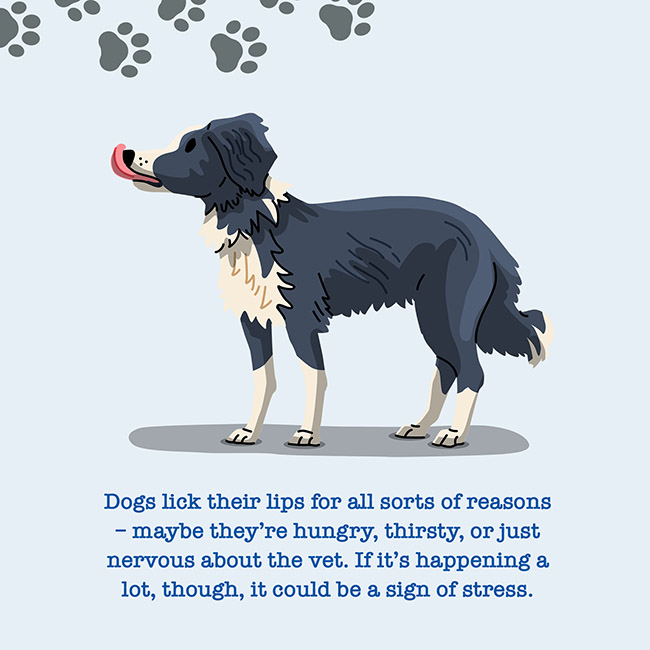
Excessive yawning
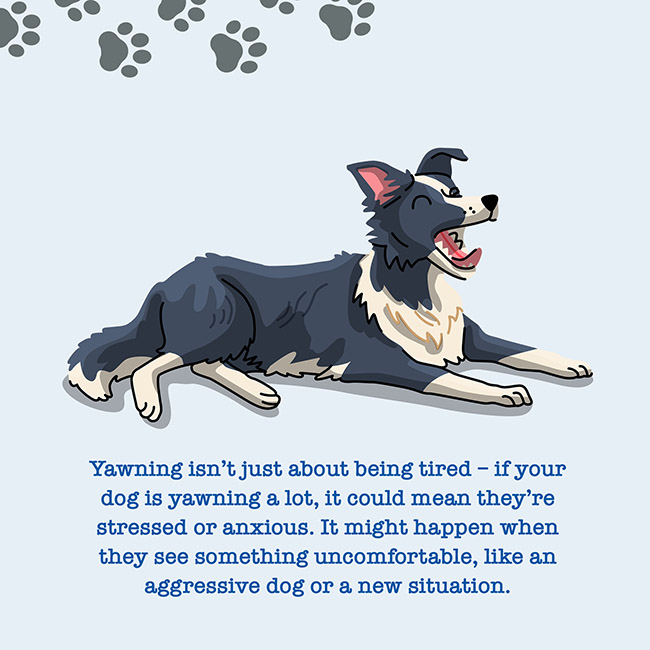
Dog turning their head from side to side
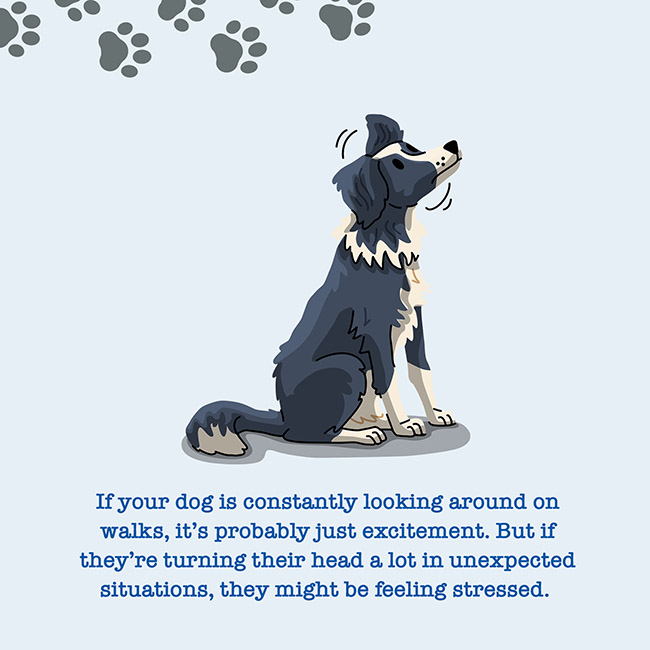
Hunching down or hyperactivity
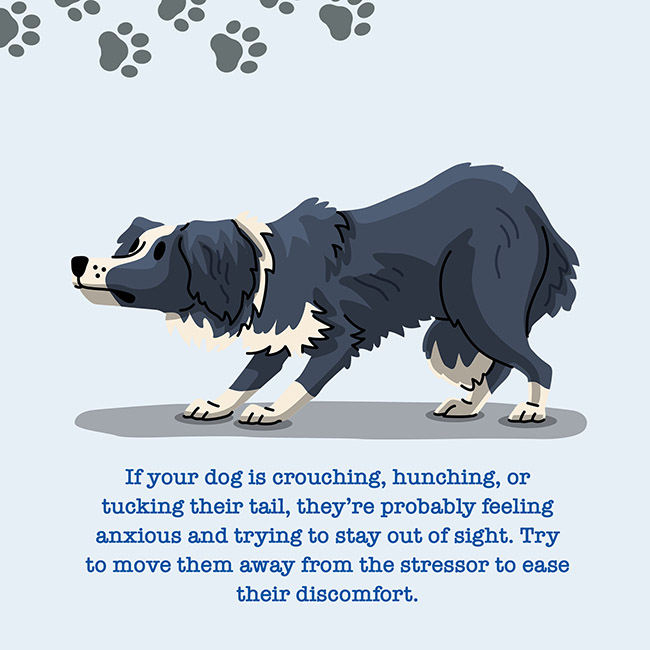
Unusual toilet habits
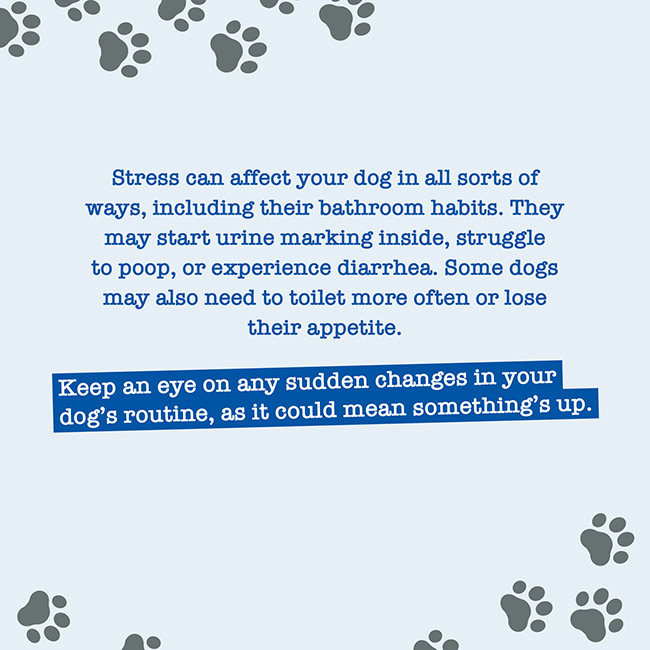
How serious are signs of stress in dogs?
The sooner you notice the signs and symptoms of stress in your dog, the less chance there is that they will escalate into more serious behavioural problems. Pets can cope with a certain amount of anxiety, but a ‘normal’ stress reaction should only last a short time and end when the trigger has gone. If it lasts longer, or happens more often, your dog’s anxiety could escalate into a fear or a phobia.
Know your dog. It’s important to recognise what your dog looks and sounds like when they are happy and relaxed. Dogs offer lots of early warning signals in relation to stress and mental health issues, so anything that seems unusual should be noted. Always speak to your vet if you’re concerned.
How to calm a stressed dog
Try these simple tips for reducing stress in dogs:
- Provide safe, quiet places to hide – like a cupboard under the stairs, or a dog crate draped with blankets.
- Avoid being with your dog constantly, as this may make it difficult for your dog to cope with being left alone, and possibly lead to separation anxiety. Try to leave your dog in another room occasionally – with a tasty chew or stimulating toy for distraction.
- Don’t crowd your dog or make too much fuss of them – they may need to retreat to their own space to feel safe.
- Stick to routines for sleeping, feeding, exercise and play.
- Manage your own voice and body language. Owner stress or erratic behaviour can lead to stress in dogs, so it’s important to keep as calm as possible around your pet.
- To prevent your dog from feeling threatened, avoid approaching them head-on. Get down to their level and don’t make direct eye contact or lean over their body.
- If your routines have changed and your dog is getting less exercise than normal, play some games together and encourage your dog to use their brain.
- Spend some time with your dog each day practising training or teaching them new commands.
- Don’t get cross – remember your dog isn’t ‘acting up’ to annoy you.
- Try a pheromone plug-in diffuser or spray at home, or specially formulated nutritional supplements (available from your vet).
All dogs are different and many factors come into play when handling a stressed dog. If your dog’s anxious behaviour persists even when they are away from stressful situations, consider asking your vet to refer you to a qualified animal behaviourist who’ll help you come up with long-lasting solutions.
Have you noticed any signs of stress in your dog, and did you find some effective strategies to reduce your dog’s anxiety? Share your tips with our other customers on social media.
